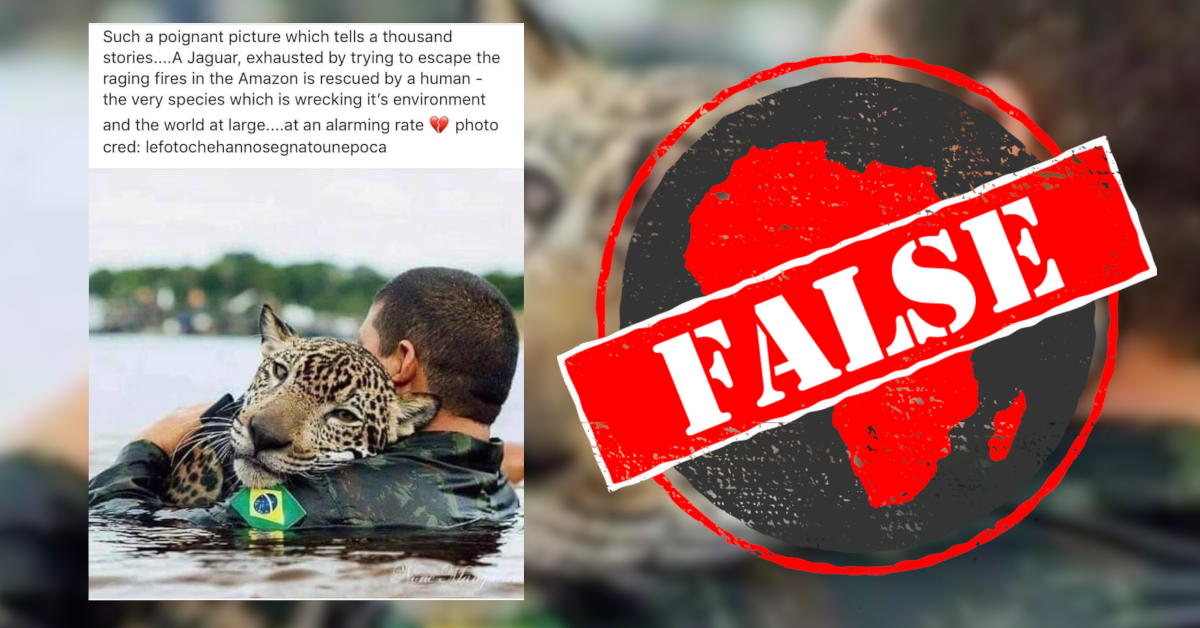A picture flagged as potentially false on Facebook shows a jaguar, a large wild cat, being held above water by a man. The man is wearing a camouflage shirt with the quite distinct Brazilian flag on the sleeve.
“Such a poignant picture, which tells a thousand stories," says the caption. “A jaguar, exhausted by trying to escape the raging fires in the Amazon is rescued by a human – the very species which is wrecking it's environment and the world at large… at an alarming rate.”
The image has also been shared on Twitter.
Wildfires in the Brazilian Amazon rainforest gained global attention since August 2019. International leaders have urged urgent action. But is this striking photo, shared nearly 5,000 times on this account, from recent events?

A Google reverse image search shows that the photo is part of a series from the project “Jaguars in the Amazon” by Brazilian photographer None Mangueira. (Note: For tips on how to verify images, read our guide).
Writing on her Facebook page on 26 June 2016, Manguiera said she was disappointed about the misuse and mislabelling of her animal pictures.
The photo actually shows a jaguar, called Jiquitaia, who was adopted by members of the Brazilian army after hunters killed his mother. It shows the large cat taking his daily swim in the Rio Negro in Manaus, the capital of Amazonas state.
“They used my photos, of a beautiful preservation project, with inappropriate and biased subtitles without the knowledge of the cause. Here's an alert for us photographers about the bad faith of third parties. Protect your projects, protect your images! Help me spread the truth!” she wrote.
The photo therefore has nothing to do with the current wildfires in the Amazon. Fact-checking sites Full Fact and Colombia Check have also reported on the widespread misuse of these images. – Africa Check
“Such a poignant picture, which tells a thousand stories," says the caption. “A jaguar, exhausted by trying to escape the raging fires in the Amazon is rescued by a human – the very species which is wrecking it's environment and the world at large… at an alarming rate.”
The image has also been shared on Twitter.
Wildfires in the Brazilian Amazon rainforest gained global attention since August 2019. International leaders have urged urgent action. But is this striking photo, shared nearly 5,000 times on this account, from recent events?

Project to save jaguars in Amazon
A Google reverse image search shows that the photo is part of a series from the project “Jaguars in the Amazon” by Brazilian photographer None Mangueira. (Note: For tips on how to verify images, read our guide).
Writing on her Facebook page on 26 June 2016, Manguiera said she was disappointed about the misuse and mislabelling of her animal pictures.
The photo actually shows a jaguar, called Jiquitaia, who was adopted by members of the Brazilian army after hunters killed his mother. It shows the large cat taking his daily swim in the Rio Negro in Manaus, the capital of Amazonas state.
“They used my photos, of a beautiful preservation project, with inappropriate and biased subtitles without the knowledge of the cause. Here's an alert for us photographers about the bad faith of third parties. Protect your projects, protect your images! Help me spread the truth!” she wrote.
The photo therefore has nothing to do with the current wildfires in the Amazon. Fact-checking sites Full Fact and Colombia Check have also reported on the widespread misuse of these images. – Africa Check
Republish our content for free
For publishers: what to do if your post is rated false
A fact-checker has rated your Facebook or Instagram post as “false”, “altered”, “partly false” or “missing context”. This could have serious consequences. What do you do?
Click on our guide for the steps you should follow.
Publishers guideAfrica Check teams up with Facebook
Africa Check is a partner in Meta's third-party fact-checking programme to help stop the spread of false information on social media.
The content we rate as “false” will be downgraded on Facebook and Instagram. This means fewer people will see it.
You can also help identify false information on Facebook. This guide explains how.


Add new comment